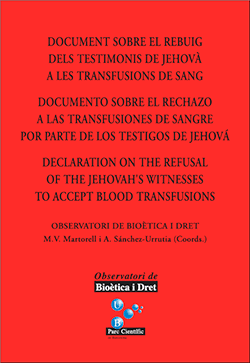The Bioethics and Law Obs.
Master in Bioethics and Law
UNESCO Chair in Bioethics
Contact
- Bioethics and Law Observatory
- UNESCO Chair in Bioethics
- University of Barcelona
- Faculty of Law
- Ave. Diagonal, 684
- 08034 Barcelona
- (+34) 93 403 45 46
- obd.ub@ub.edu
- Master in Bioethics and Law
- (+34) 93 403 45 46
- master.bd@ub.edu
The OBD publishes a new report on the refusal of Jehovah's witnesses to accept blood transfusions
 COMUNICACIONS UB, Barcelona Science Park (Spain), december 12th 2005
COMUNICACIONS UB, Barcelona Science Park (Spain), december 12th 2005
In accordance with their beliefs, Jehovah's Witnesses do not accept blood transfusions. How should health professionals react to this? Should the decisions of these patients be respected even when they may put their lives at risk? How should this be done?
In this regard, the Opinion Group of the Bioethics and Law Observatory (OBD), a group that belongs to the Universitat de Barcelona (UB; University of Barcelona) and is located at the Parc Científic de Barcelona (PCB, Barcelona Science Park), has published a “Declaration on the refusal of Jehovah's Witnesses to accept blood transfusions”. This report provides useful guidelines for society at large, healthcare centres and public administration that will help to clarify the debate on whether the health-related decisions taken by the Christians known as Jehovah's Witnesses should be respected even when the final outcome may be life-threatening. The report, which has been presented today in a press conference, has been coordinated by Ana Sánchez Urrutia, lecturer in Constitutional Law at the UB, and by Victòria Martorell, physician at the Hospital de la Santa Creu i Sant Pau de Barcelona and specialist in hospital management.
The debate addressed by the Observatory has arisen from the situation that occurs in healthcare centres when treating patients that are members of the Christian denomination called the Jehovah's Witnesses. From the perspective of traditional medical ethics, morally correct action is considered to be that which benefits the patient, the definition of “beneficial” being decided by the physician. However, at present, there is a movement towards promoting individual autonomy, which, in this case, grants the patient the freedom to accept or refuse the procedures recommended by the physician. Acceptance of this principle by health professionals is not uniform and may lead to situations in which the convictions of these professionals are given precedence over those of the patient if life-threatening circumstances develop.
The new report of the Observatory is the result of multi-disciplinary dialogue between specialists in medicine, nursing, philosophy, biology, anthropology, geography and law. It recommends, firstly, that health authorities ensure that Jehovah's Witnesses can exercise their rights by taking the appropriate measures to ensure that the decisions made by this group are respected. In this regard, this report considers that health authorities must draw up procedural guidelines for all centres and reach a consensus with representatives from the Jehovah's Witnesses on an instrument to ensure respect for the wishes of the members of this community and also provide health professionals a secure framework in which to exercise their profession.
In addition, the report recommends that each health centre develop a specific admission protocol for Jehovah's Witnesses, which should include alternative treatments and therapeutic procedures, in addition to ethical and legal considerations. In this respect, the report proposes that a specific informed consent model be drawn up with provision for alternative treatments available.
Furthermore, the report states that refusal of treatment must be expressed in writing, as established by the law, and that the informed consent form must be signed in such a way to assure total understanding of the risks that this decision entails on the part of the patient. In cases in which patients are unable to directly express their will, or in life-threatening circumstances, the report recommends the completion of a specific living will. In addition, the report upholds that surrogate decisions should not be accepted in the case of children when refusal of medical treatment involves a serious risk to the life or heath of the child.
Finally, the recommendations made by the Observatory include the development of public health policies designed to provide alternatives to blood transfusions. Thus, health authorities must seek to establish a balance between, on the one hand, the principles of justice, solidarity and equality, and on the other, the autonomy of the person who refuses to accept the standard recommended treatment while asking for another, since the request for an alternative may involve increased public expenditure, which, at a time of budget restraint, may affect the provision of other services.
The legal context of this debate is reflected in several regulations that recognise, among others, the right to exercise religious freedom, established in The Universal Declaration of Human Rights, and the principle of autonomy, established in regional and state legislation, which recognises the right of the patient to freely choose between treatment available and the need for his/her informed consent. In this regard, Article 5 of the Council of Europe's Convention on Human Rights and Biomedicine establishes that “an intervention in the health field may be carried out only after the patient concerned has given free and informed consent to it”. The Spanish Constitution also upholds that a person's right to life cannot be considered hierarchically superior to his/her right to defend personal convictions. Moreover, in these cases state interventions can be justified only when the lives and health of third parties are at stake.
This new report will be presented on Monday 12 December at 19.30 h in the Antoni Caparrós Auditorium at the PCB. The presentation will be chaired by the rector of the UB Màrius Rubiralta, and will include contributions from the coordinators of the report Ana Sánchez Urrutia and Victòria Martorell, and from María Casado, director of the Bioethics and Law Observatory.
- Document [PDF]



